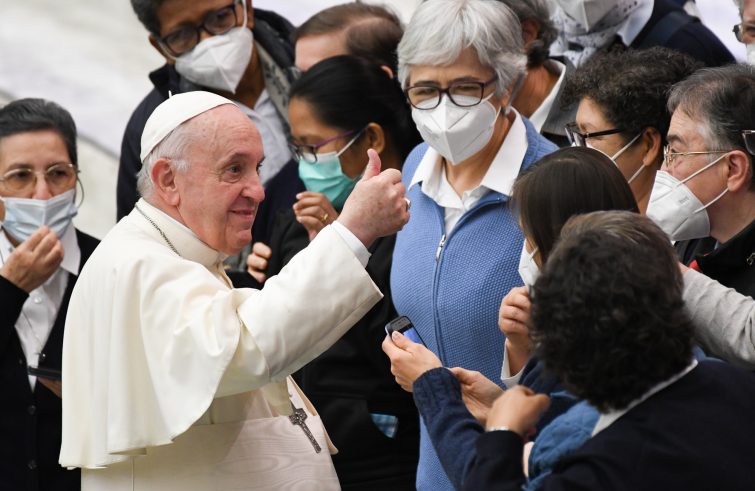
“Today, there are many who still seek religious security rather than the living and true God, focusing on rituals and precepts instead of embracing God’s love with their whole being”, the Pope said in the catechesis at Wednesday’s general audience in Paul VI Hall. “This is the temptation of the new fundamentalists – the Pope added in unscripted remarks – those who seem to be afraid to make progress, and who regress because they feel more secure: they seek the security of God and not the God of our security. Those who seek security, the small group, who live ‘as it was back then’”, “distance themselves from the Spirit.” “This is why Paul asks the Galatians to return to what is essential, to the God who gives us life in Christ crucified”, the Pope explained.
“If we lose the thread of the spiritual life, if a thousand problems and thoughts assail us, let us heed Paul’s advice: let us place ourselves in front of Christ Crucified, let us begin again from Him”, Francis’ exhortation: “Let us take the Crucifix in our hands, holding it close to our heart. Or we can even take some time in adoration before the Eucharist, where Jesus is Bread broken for us, Crucified, Risen, the power of God who pours out his love into our hearts.”
Still guided by Saint Paul, Francis called on the faithful: “Let us ask ourselves: what happens when we meet Jesus Crucified in prayer? The same thing that happened under the cross: Jesus gave up his Spirit, that is, he gives his own life. And the Spirit which flows forth from Jesus’ Passover is the origin of the spiritual life. He changes hearts: not our works. He is the one who changes the heart, not the things that we do, but the action of the Holy Spirit in us changes our heart! He guides the Church and we are called to be obedient to his action, who blows where and how he wills.”
For Saint Paul the works of the flesh are the fruit “of behaviour that is solely human, ‘sickly’ human”, which “refer to the selfish use of sexuality, to magical practices connected with idolatry and to all that undermines interpersonal relationships such as enmity, jealousy, dissension, divisions, factions, envy…”. The fruit of the Spirit, instead, is “love, joy, peace, patience, kindness, goodness, faithfulness, gentleness, self-control.”
“The Apostle calls them works of the flesh not because there is something erroneous or bad about our human bodies”, Francis pointed out. “Instead, we have seen how much he insisted on the reality of the human flesh that Christ brought to the cross! Flesh is a word that indicates the person’s earthly dimension, closed in on itself in a horizontal existence, following worldly instincts and closing the door to the Spirit who lifts us up and opens us up to God and others. But the flesh also reminds us that everything gets old, that it all passes, withers, while the Spirit gives life.” Christians are called to live according to the Holy Spirit: “It can be a good spiritual exercise, for example, to read Saint Paul’s list and take a look at our own behaviour to see if it corresponds, if we are truly living according to the Holy Spirit, if we are bearing these fruits”, the Pope’s advice: “a person in whom the Holy Spirit dwells can be recognized by these traits. A person who is in peace, who is joyful and who loves. With these three traits, the Spirit is seen.”
“Sometimes, those who approach the Church get the impression that they are dealing with a dense mass of rules and regulations”, Francis denounced, adding extempore: “But no, this is not the Church! This can be whatever association.”
“The beauty of faith in Jesus Christ cannot be grasped on the basis of so many commandments or of a moral vision developed in many layers which can make us forget the original fruitfulness of love nourished by prayer from which peace and joyful witness flow”, Francis remarked: “In the same way, the life of the Spirit, expressed in the Sacraments, cannot be suffocated by a bureaucracy that prevents access to the grace of the Spirit, the initiator of conversion of heart.” “And how many times we ourselves – is the Holy Father’s mea culpa – priests or bishops, follow so much bureaucracy to give a sacrament, to welcome people, so that people say: ‘No, I do not like this’, and they do not go, and many times they do not see in us the power of the Spirit who regenerates, who makes everyone new.”










